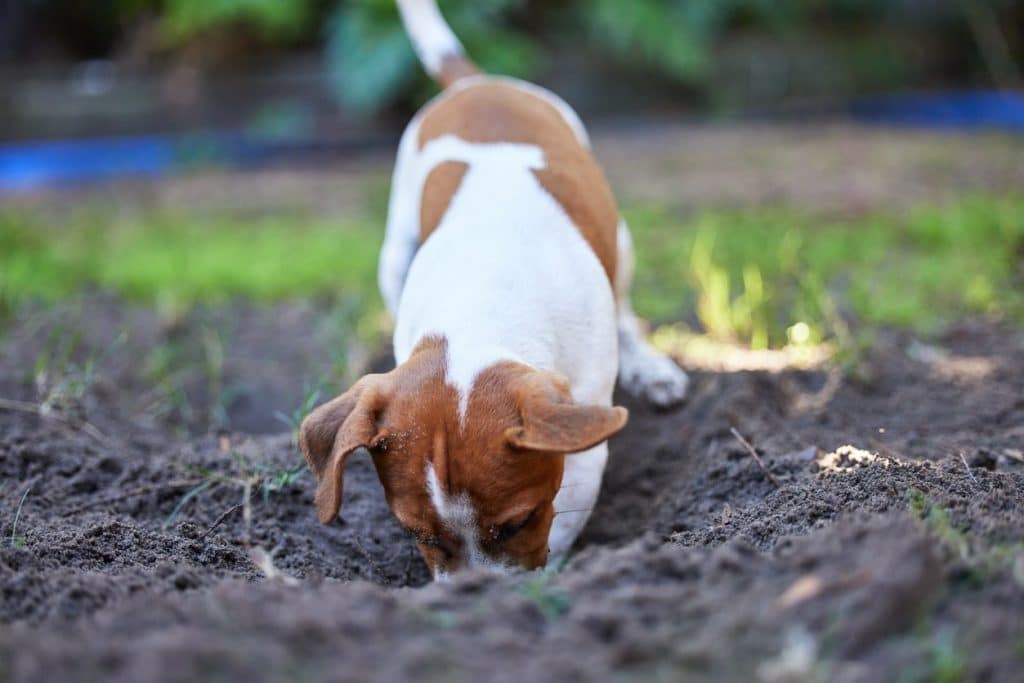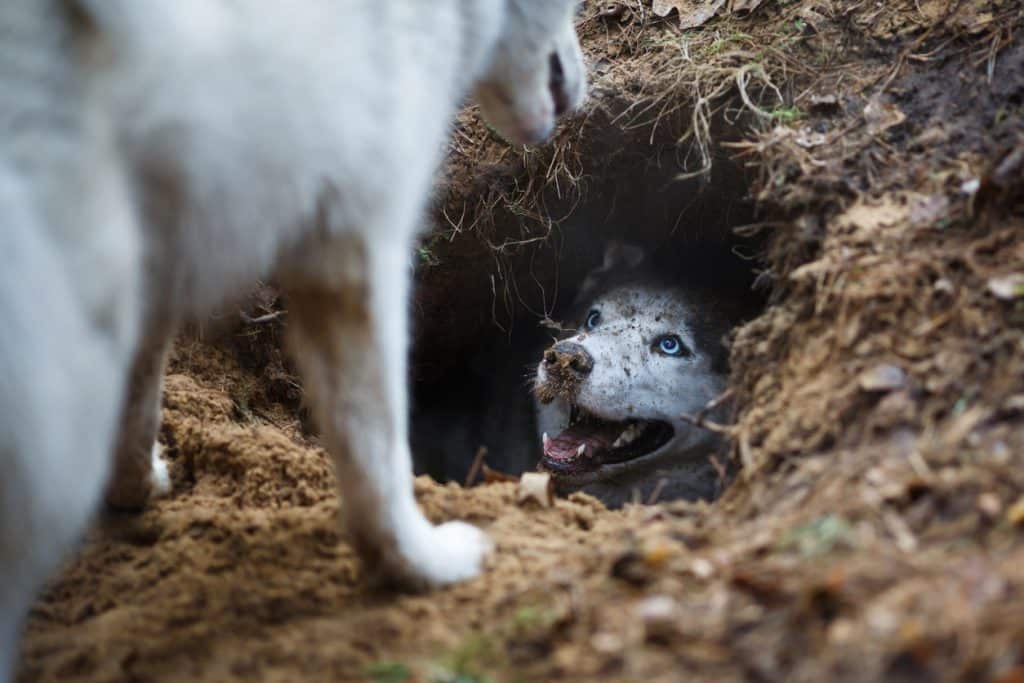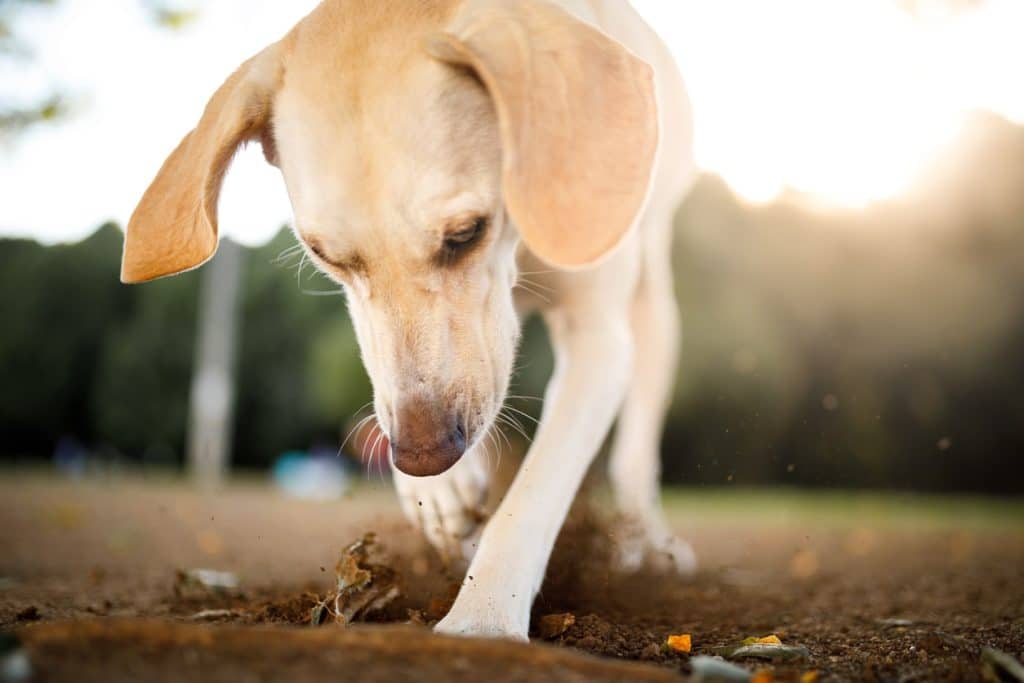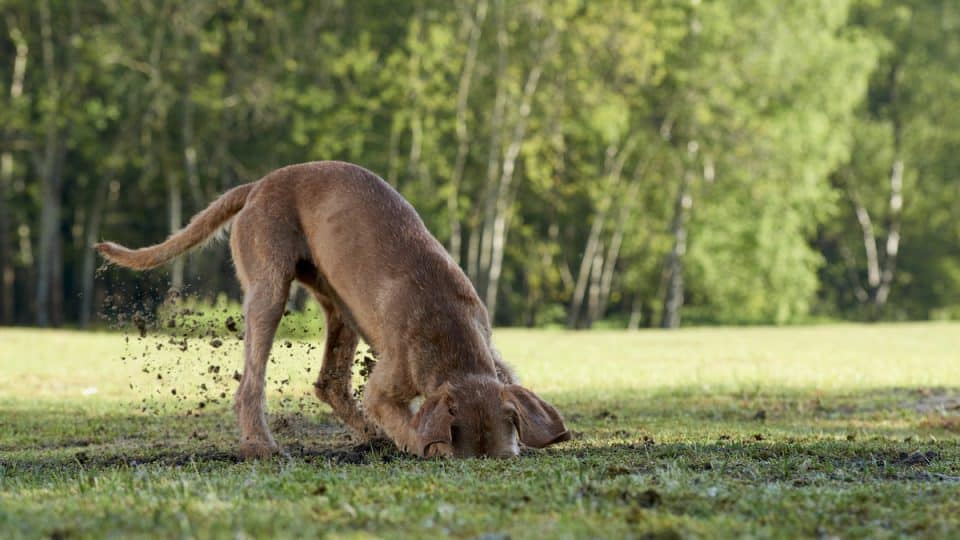- This post contains affiliate links. Read more here.
- Not a substitute for professional veterinary help.
Sometimes, when your dog comes in from the yard, you notice their nose is suspiciously dirty. You look down at their paws, and they are covered in mud. That can only mean one thing…your lawn has a new hole.
While frustrating, Jennifer Abrams, an Associate Certified Applied Animal Behaviorist (ACAAB), explains that “some amount of digging is a natural, normal behavior in dogs.” Additionally, dogs dig because they need exercise or play, have a strong prey drive, or could be trying to engineer a fun escape route. Figuring out how to stop your dog from digging is based on why they dig so you can provide an alternative outlet for their needs.
Below, we’ll deep dive into all things dog digging, including the reasons behind the lawn-destroying behavior and how pet parents can stop it.
1. They’re bored
Dr. Sabina Kong, a veterinarian and longtime dog trainer, explains that more often than not, dogs dig because they’re bored. Digging can be satisfying and rewarding for dogs, not to mention a great way to get your attention!
The answer to boredom digging isn’t always easy, but it is straightforward: keep your dog well-exercised and maximize their opportunities for mental stimulation.
How to stop boredom digging
- Add an extra walk to the schedule: A tired dog is less likely to dig—which is where physical exercise can help. If there’s no room in your schedule for an extra walk, hire a dog walker who can take your pup out to burn some energy.
- Prioritize energy-burning games: Bored diggers can benefit from active games like frisbee and fetch. If you’re tired, don’t panic; automatic ball launchers and self-moving toys can keep your dog engaged.
- Incorporate puzzle toys into a dog’s daily routine: Puzzle toys come in a variety of difficulty levels, including simple slow-feeders. These require dogs to learn to remove pieces of the game in order to access the treats.

iStock/PeopleImages
2. They’re hunting for prey
“Humans have ‘hardwired’ digging behavior in some breeds,” Abrams explains. She says a great example of this phenomenon is with breeds whose original jobs were to chase and follow small animals into their burrows, like Jack Russell Terriers, Afghan Hounds, and Greyhounds.
These dog breeds often have a strong drive to dig as they are searching for prey. Though we might not see the small creatures ourselves, our dogs can. They will keep digging until they catch their prey.
How to stop prey digging
- Games for prey-seeking behavior: Traditional puzzle toys often appeal to food-motivated dogs, but you want something that also speaks to the prey instinct. Toys that compel a dog to burrow or chase, such as snuffle mats fit the bill, as do self-moving toys.
- Flirt poles: Flirt poles are another great option to focus dogs who have a strong prey drive. These toys are designed to be interactive so that humans can play with their pups in a way that helps them get in tune with their instincts.
3. They’re making a den
Some dogs may dig up your yard to look for a safe place to den—a quiet, cozy hiding spot. If you often find your dog lying in the hole they’ve made, or if they often make holes in the same place, they are likely digging a den.
How to stop den digging
- Dog houses: A dog house can satisfy a dog’s denning instinct nicely, and it’s an especially good choice if your dog likes to spend time outside. Consider a heated option if your pup will be out there in the winter.
- Cave beds: Cave beds are another good choice for pups who like to burrow since they offer shelter and lots of soft fabric to dig into. They do, however, tend to be soft and cozy, which may mean they’re a better choice for an indoor den than an outdoor one.
- Dog tents: Dog tents are for the outdoors and offer weatherproof shelter and shade in the warmer months. They don’t have to be a permanent yard feature; many are easy to take down and set up again as needed.

iStock/castenoid
4. They’re cooling down
Many dogs, particularly in warmer weather, dig as a way to cool down. The soil below the surface is cooler than the warm top dirt, and a freshly dug hole is a great place to chill. If your dog is digging shallow pits in your yard and then laying in them, there’s a good chance they’re digging because they’re hot.
How to stop digging to stay cool
Luckily, there are a variety of products out there that can help to keep a dog cool while outdoors, including:
5. They’re trying to escape
Some dogs dig as a way to escape an enclosure, which can lead to some scary moments for pet parents. If you have an escape artist, stopping them from digging can keep them from running away or getting lost.
How to stop escape digging
Need to stop your dog from digging? Set up barriers that go into the ground where your dog likes to dig to escape. Barriers like the Dig Defence are a better solution. A system of sturdy metal stakes in the ground just in front of your fence line is a great way to cordon off areas where a dog could feasibly dig to escape. You can purchase the bars in 4-, 10-, or 25-section packs.
Should I See A Dog Trainer to Stop Digging?
While the best way to stop a dog from digging is to redirect their focus to something positive, sometimes that’s not enough. If your dog’s digging seems excessive or you’re having a hard time finding solutions that work for you and your dog, Abrams recommends consulting a behavior professional for assistance.
Look for dog trainers through credentialed, established organizations like Certified Applied Animal Behaviorists and the International Association of Animal Behavior Consultants. Alternatively, you can make an appointment with a veterinary behaviorist.

iStock/Capuski
Takeaway
While digging can be a frustrating dog behavior, punishment is not an effective solution and will not deter a dog’s behavior. In fact, it could increase their anxiety and their desire to dig.
If you catch your dog digging in an area where they shouldn’t, redirect their attention in a positive way (like interactive play or a walk). If you are using a designated digging area, like a sandbox, it might be as simple as leading your pup over to the right place to dig. Another way to redirect digging is with a no-dig spray. NaturVet Off Limits is a relatively popular herbal choice to keep pets away from specific outdoor areas
When they do refocus and engage in another behavior, make sure to give them plenty of positive reinforcement and praise!





